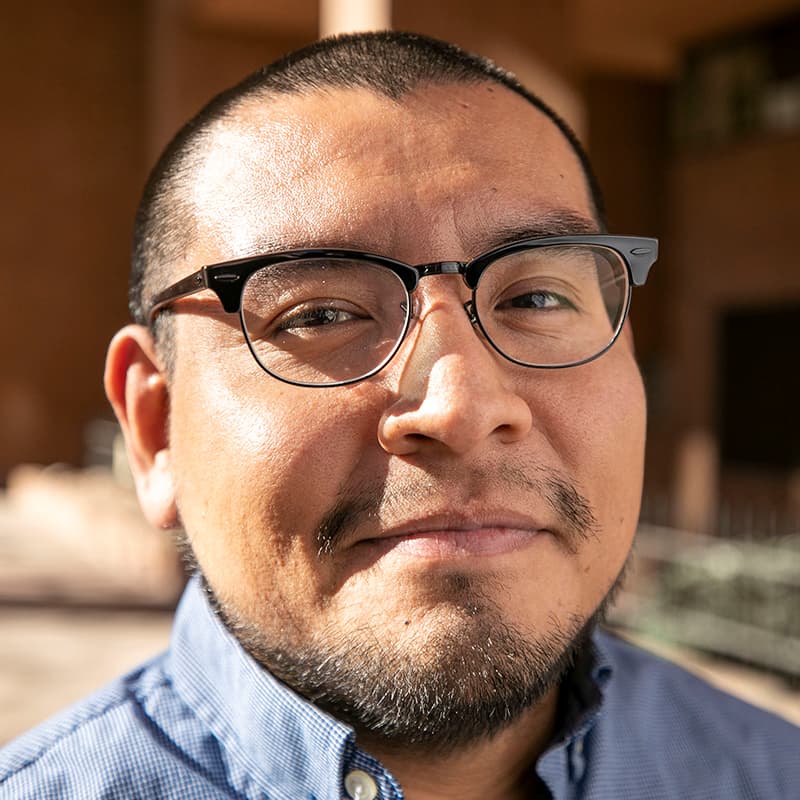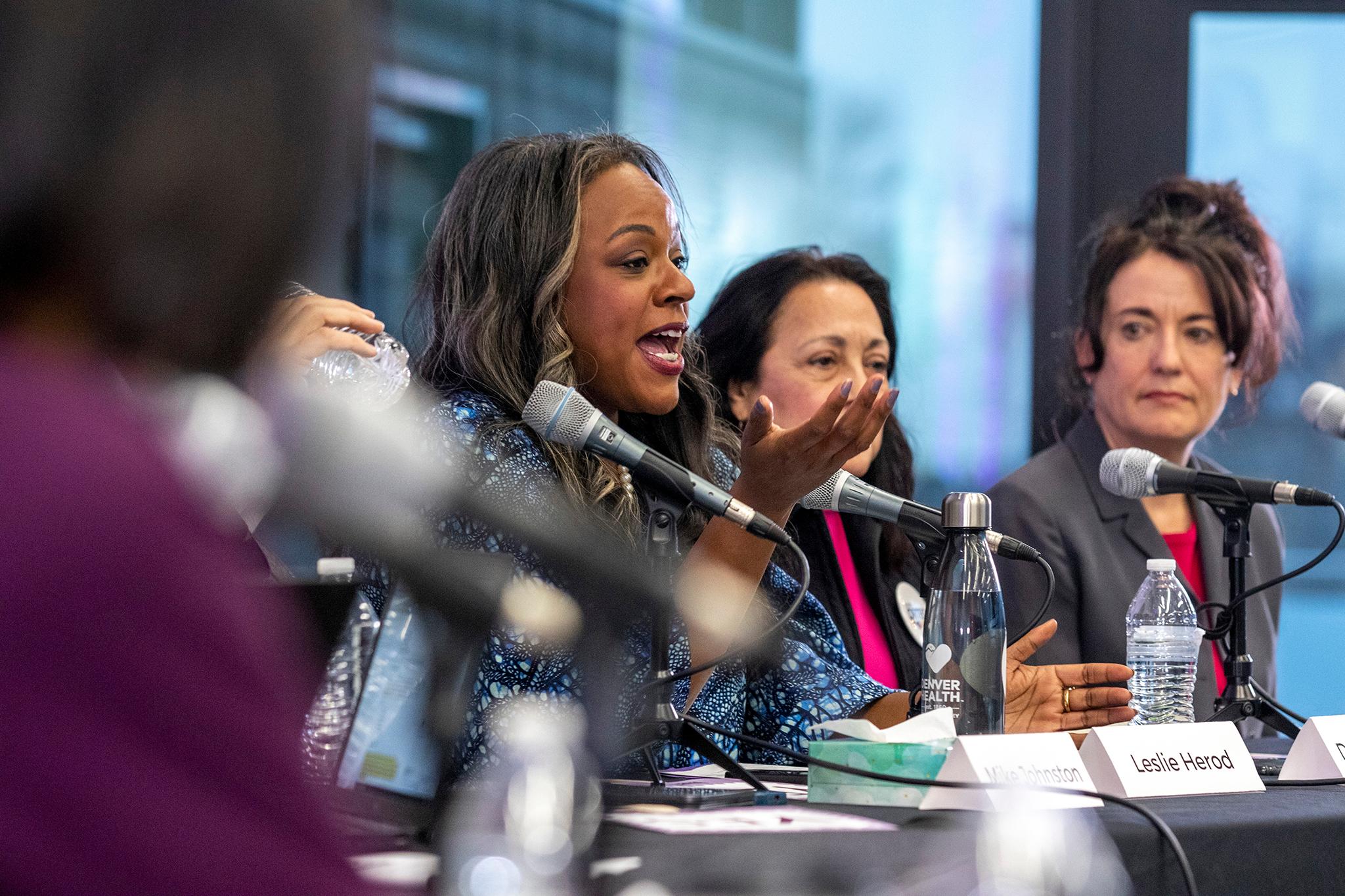As part of our 2023 voter guide, we asked each mayoral candidate on the ballot to fill out a questionnaire. You can read short biographies of each candidate and find their questionnaires here.
Please answer the following questions with a yes or no.
Should the conservation land easement on Park Hill Golf Course be lifted? No.
Assume the police force is fully staffed, should Denver hire more police officers? No.
On that note, would reducing the police budget to fund diversion programs and other potentially crime reducing initiatives ever be an option for your administration? Yes.
Should Denver plow streets after snow storms more often even if it means over budgeting for it? In certain circumstances.
There's a bill at the legislature that would allow a version of local rent control. If it became law, should Denver enact rent control measures? Possibly.
Should Denver institute mandatory holds on people interacting with law enforcement who are in mental health or addiction crises? No.
If state law allowed them, should Denver have supervised drug use sites? Yes.
Is the mayor's office too powerful? Yes.
Does Denver need more bike lanes? Yes.
Does Denver need more parking lots? No.
Feel free to elaborate on these questions.
What are the biggest threats Denver faces in the next 30 years, and what will you do about them given that you could be mayor for 12 years?
Denver is growing, and for too long it has been growing without a cohesive and coordinated plan. Without change, the next 30 years will see an increase of all the challenges we face today. Lack of housing affordability, transportation issues, poor air quality, and public safety threats.
If elected, I will work with stakeholders across the city to develop interconnected solutions that address the root causes of many of the issues we face. From a truly multimodal transportation system to housing that local teachers and firefighters can afford to live in, we must plan for the future, together.
What do you admire about Mayor Michael Hancock's administration? What would you improve on?
I like the MY Denver Card and I think the Hancock administration adequately handled the COVID-19 pandemic crisis as best they could from the city's limited scope.
We need to do better on housing affordability and homelessness. The current policies aren't working, and we will move quickly to change direction in my administration.
What steps would your administration take to make Denver more affordable?
Safe, healthy, accessible, affordable housing is a human right, yet a home has become a luxury many in Denver cannot afford. We need diverse housing options to reduce costs while ensuring people can afford to live in the neighborhood they grew up in. Last year, I led the creation of the Colorado Middle Income Housing Authority that will deliver thousands of attainable housing
units for families. As mayor, I will fight for resources to create truly affordable housing and end chronic homelessness; zoning reforms to prioritize fair housing; protections to stabilize tenants; and ways to expand permanent affordability.
Sweeps or no sweeps? You can add some nuance here, but you must answer "I would continue the sweeps" or "I would end the sweeps."
The question on everyone's minds right now is "what will the next mayor do about street camping." To be clear, one of the first orders of business of my administration will be to replace Denver's camping ban with a compassionate solution that works. The current policy has failed from all sides. It hasn't reduced encampments on our streets and it is harmful for our unhoused neighbors. Denver voters don't want to continue with failed policies of the past. We must develop a new response that includes comprehensive housing and safety programs.
Permitting wait times in Denver have increased significantly, sometimes slowing down how fast housing can be built. What do you think is the problem and how would you fix that?
Permitting delays in the city are at an all-time high. Not only does this mean that development is curtailed and slowed down, but it also disincentivizes creativity and innovation by developers. We will re-invest in city employees to fill staffing shortages and get Denver moving again.
Via executive order, we will direct departments to take a hard look at permitting processes to determine how we can better prioritize housing that is affordable and meets the city's needs. To expedite the process, the order will require that pending housing applications with all units at or below 120 percent of AMI receive final development approval within 90 days from the date of the order.
What are your thoughts on converting downtown empty office spaces into residences?
We must take a comprehensive approach to making housing more affordable, and there are a myriad of options on the table, including zoning reform. However, no option will solve the problem by itself. As mayor, I'll bring stakeholders and community members to the table to find a multifaceted solution that works for our city.
Black-owned businesses like Coffee at the Point and Wah Gwaan Brewing Company have been shutting down. Should the city intervene to preserve Black entrepreneurship, and if so, how?
I have been very vocal about saving these Black owned businesses and how we support underrepresented business owners and founders in this city. I was a lead sponsor on a number of bills that helped women and minority businesses survive Covid. As mayor, I will work with my equity and economic development heads to ensure our minority owned businesses can succeed in this city.
How do you feel about land acknowledgements?
Knowing our history is important to ensuring we can learn and grow as a society. It is important to acknowledge what was forcibly taken from Indigenous people and that it is not ours. As mayor, I will ensure that this is properly acknowledged at any public or private events on native lands.
What are your thoughts on a flavored tobacco ban?
I opposed these bans because they disproportionately target communities of color.
Describe specifically how your office will demonstrate transparency?
My administration will demonstrate transparency by setting up a dedicated Accountability Office within the City. Our departments will be held accountable in doing the work of the City under my leadership.
The Accountability Office will embrace technology and adopt a CityScore-inspired initiative, originally developed by former Mayor Marty Walsh of Boston and since adopted by other cities across the country. This data-driven system employs real time key performance metrics to inform the mayor and the general public of how well the city is performing on its stated priorities.
When's the last time you rode RTD?
Some of the most popular bus and light rail routes are in my district and I often use them to commute to the Capitol. I also opt to take public transportation when traveling to see best practices in other parts of the country and the world.
Vision Zero, Denver's initiative to eliminate traffic deaths, could be going better. What would you do to improve that?
Safety is one of my top priorities, and Vision Zero is an important part of that. My administration will prioritize the freedom to move about, with pedestrians being a top priority. This means we need to prioritize our sidewalk network. With Ordinance 307 passing, we are creating one stream of funding to help. I intend to look for additional funding streams.
We need to do more than just build sidewalks, we must encourage people to use them. Wherever possible, I will be instructing Parks and Rec and the Department of Transportation to build out our tree canopy and work to build setbacks from our more populated arterials. In addition to sidewalks, bike lanes will also be a top priority. Specifically, high comfort bike lanes or protected lanes. Denver can build out a pedestrian and bicycle network that keeps our residents safe and encourages them to use it.
Finally, another area that my administration will focus on is shared spaces or uncomfortable driving zones. If the pandemic shutdown taught us anything, it is that making safe spaces works. I will instruct DOTI to grow the recently created "outdoor places program," which derived from the shutdown called "temporary outdoor patio expansion program." Areas like Larimer Square from 14th to 15th is a huge success, but shouldn't be limited to just downtown, and we must identify areas that can benefit from treatments like this all around the city.
The EPA has declared Denver a "severe" violator of federal ozone standards. What actions would you take to reduce ozone precursor emissions within the city?
Denverites want clean, healthy air. They love seeing their iconic mountains glistening above the city. They love the four-season climate that draws them outdoors throughout the year. But in recent years, that's not what Denverites have been getting. Instead, the "brown cloud" has returned.
The simple act of breathing is unhealthy for too many, too often. And the dirty air that they see comes from the same polluting sources as the climate-changing greenhouse gasses that they can't see. Greenhouse gasses may be invisible and odorless, but Denverites can and do see the climate harms they cause - excessive summertime heat, nearby forest fires, increasing drought and periodic extreme weather events such as flooding.
Air pollution is a regional problem; climate change is an international problem. Denver can't solve them by itself. But Denver can establish a track record of leadership in both areas and use that leadership to build alliances with other communities near and far to produce solutions at the necessary scale.
My administration will ensure Denver is a "top 5" climate city in the nation, and meets its science-based targets of 65 percent carbon pollution reductions by 2030 and 100 percent by 2040.
What's the worst intersection in Denver?
For Denverites that live in different parts of our city, there are completely different "worst" intersections, and the reasons they are bad are for different reasons. From traffic signals that take too long to dangerous intersections that have a higher frequency of accidents, transit and transportation woes are shared by people in every neighborhood and every corner of Denver. That's why my administration will re-engage with neighborhood associations and community leaders to ensure that we aren't just focusing on central Denver, but that we are addressing concerns from across the city.
Need more help voting? Check out the rest of our voter guide here.











